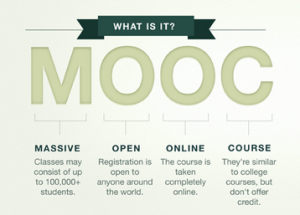An Overview of MOOCs and Why They Matter
This is the first of a series of posts about the relevance of MOOCs and their potential to transform instructional delivery

My preferred sites and apps are those that help me stay abreast of news and developments, especially in the areas of technology, instructional design, and online learning. I subscribe to Feedly for the latest articles from such sites as Edutopia, the Center for Digital Education, and the International Society for Technology in Education (ISTE). Years ago, I read an article that pointed to a TED presentation by Dr. Anant Agarwal, president of edX, one of the pioneering MOOC (massive open online course) providers. Â
In his presentation, entitled “Why massively open online courses (still) matter,” Dr. Agarwal discusses the ongoing relevance of MOOCs and their potential to shape the future of instructional delivery and the overall state of education–everywhere. In addition to edX, mainstream organizations such as Coursera, Khan Academy, and Udemy promote MOOCs and their usefulness in sustaining continuous and lifelong learning. Dr. Agarwal’s endorsement of MOOCs offers greater context for accelerating the adoption of flipped classrooms and blended learning within regular education, especially as a means of engaging students while explore the practical relevance of classroom learning in their life experiences.
Our focus is on workforce development skills for K-12 students. Â Our approach extends workforce development far beyond career exploration or career selection activities. Our initiatives are designed to help students develop their awareness of and proficiency in skills which are demanded by employers.
Dr. Agarwal’s lecture prompted several questions regarding our work with K-12 educators and students:
- How are MOOCs being used in the general K-12 education curriculum?
- What types of workplace readiness training resources are available for K-12 educators and students? Â How effectively are they being utilized?
- What standards exist for K-12 workforce readiness education and training?
The Pennsylvania Department of Education has collaborated with educators and partners to provide resources on career education and work. As good as the list may be, there may be others worth considering. Â Let us know what is being used in your school.